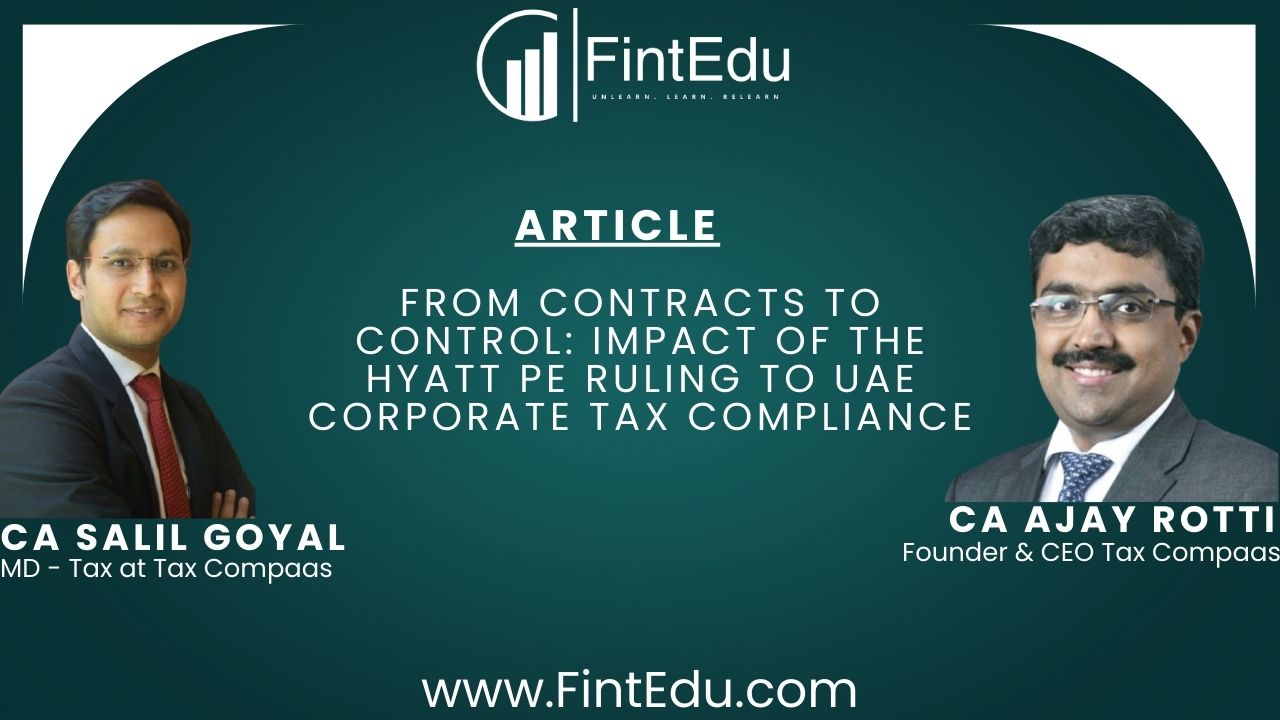Listen this Article
1. IntroductionThe recent Hyatt International permanent establishment ruling by the Indian Supreme Court could have significant implications for UAE businesses and tax practitioners. In a landmark 2025 ruling, India’s Supreme Court held that a UAE-incorporated company, established a taxable Permanent Establishment (PE) in India, despite having no physical office there. This outcome, based on the company’s substantial involvement in an Indian affiliate’s operations, offers important lessons on how “substance-over-form” is applied to PE determinations. With the UAE’s new corporate tax regime now in effect, understanding this case can help local professionals navigate legal interpretations, practical compliance, and risk mitigation under similar circumstances.
2. Background
The Hyatt case centered on a Dubai-based, UAE-resident company that provided Strategic Oversight Services Agreement (”Consultancy agreement” or “SOSA” ) to hotels in India under long-term agreements (~20 years). The company claimed it had no fixed place of business or staff permanently in India, noting that all of its employee visits were temporary and within treaty limits. It also emphasized that day-to-day hotel operations were run by a separate Indian entity, with the UAE company’s role limited to high-level strategy and technical guidance.
Indian tax authorities, however, argued that Hyatt’s role went far beyond consulting. They observed that Hyatt’s personnel exercised continuous operational control (implementation and not just consulting) over core functions, from appointing key staff and training to financial oversight, largely via the hotel’s General Manager who reported to the UAE company. Both the Tax Tribunal and the Delhi High Court sided with the Revenue, concluding that a PE existed and that profits attributable to it were taxable in India.
In July 2025, the Supreme Court of India upheld these findings. It ruled that a foreign company can have a PE without an office or exclusive premises if it effectively controls and manages core business functions in the host country over a sustained period. The Court noted that Hyatt’s 20-year oversight agreement (with revenue-linked fees and gross profit share ) gave it an enforceable right to dictate policies and ensure compliance in all important aspects of the Indian hotels’ management, far exceeding a mere consultancy role. This degree of substantive control met the criteria of a “fixed place” PE under the India-UAE tax treaty, even though Hyatt had no formal branch or staff stationed beyond short visits. Crucially, the Court held that the “disposal test” for a fixed place PE “does not require exclusive possession” of space; what matters is that the foreign enterprise had regular functional access to the business premises to conduct its operations. In other words, economic reality prevailed over legal form, continuous, coordinated involvement in the local business created a taxable presence, regardless of contractual disclaimers or global profitability.
3. Substance Over Form
The Hyatt judgment underscores a broader trend in international tax: substance-over-form in PE determination. Several legal interpretations from the case stand out:
- Significant Control Equals Presence: If a company exercises significant control, oversight, and management over core functions of a business in another country (through its employees or agents there), it can constitute a fixed PE even without a formal office. The sustained involvement of Hyatt’s personnel in operational decisions and strategic management tantamounts to the company itself “being” in India for tax purposes. The ruling drew on a prior decision (Formula One case) to affirm that even short-term or rotating use of premises can form a fixed place PE when there is a pattern of continuous business activity and dependence.
- “Disposal” of Premises Reinterpreted: Traditionally, having premises “at one’s disposal” implied some exclusive access or physical presence. The Court in Hyatt rejected a narrow view of this test, exclusive space is not required. It is sufficient that the foreign enterprise has regular access to and use of local facilities to carry on its business. In Hyatt’s case, the hotel itself effectively became the place of business for the UAE company whenever its policies were implemented and its personnel were on-site performing key functions.
- Economic Substance Over Legal Form: The judgment made clear that labels in contracts or corporate structure won’t shield against PE status if the actual conduct shows a foreign company is “at home” in the local business. Hyatt’s agreements stated services would be rendered from Dubai and its local presence was minimal, but the economic reality, a 20-year revenue-sharing arrangement and deep functional integration into the hotel operations, overrode those formalities. Reference was placed on Section 4 of Article I of the SOSA deals with the ‘title to the hotel’. It provides that if the hotel owner desires to obtain financial assistance for the construction or refinancing of the hotel – or if the hotel is to be used as collateral for any borrowing unrelated to the hotel business – the owner is required to obtain a non-disturbance and attornment agreement from the lender, which must be acceptable to the UAE Company. Thus, it is expected that Tax authorities and courts will continually look beyond written agreements to the practical balance of power and functions.
These interpretations signal that companies must carefully assess how their cross-border operational arrangements might be viewed by tax authorities. Formal lack of an office or long-term staff is not a guarantee against PE – it’s the “substantive footprint” in the local economy that matters.
4. Some of practical takeaways in the light of the Industry practice and the given case:
It is well-established in the hospitality sector that long-term strategic assistance agreements and revenue-sharing arrangements are common between brand owners and hotel operators. In many cases, local subsidiaries enter operational contracts with hotel owners, while the parent brand entity retains rights to royalties and management fees through back-end agreements. This layered structure raises important questions about the appropriate tax characterization of such payments. The Hyatt case could be different from a few other business models prevalent. To that extent the following factors still can have varying tax implications :
I. Royalty vs. Permanent Establishment (PE) Classification
In cases where payments under agreements similar to the Strategic Oversight Services Agreement (SOSA) are in the nature of royalties and taxable in the hands of the hotel owner, the findings in this case would not be applicable. A few other aspects which would make the current findings inapplicable could be:
- The absence of clear contractual delineation between the hotel owner, the local subsidiary, and the UAE parent.
- The relevance of group-level losses, which complicate profit attribution to any deemed PE.
In fact a safer approach is also followed by some players in Industry worldwide to consider payments not typically Royalty but associated to it are conservatively considered as Royalty.
II. Profit Attribution and Salary Allocation and possible VAT exposure
If a PE is deemed to exist, the mechanism for attributing employee salaries becomes unclear. This raises critical compliance questions:
- Would deemed salaries trigger withholding tax obligations under PE rules?
- Could this lead to VAT exposure, given that the SOSA implies a service relationship between the PE and the hotel owner?
III. Treatment of Royalty and Technical Fees
Whether the PE is permitted to deduct royalty or technical service fees? This touches on a broader tension between:
- The OECD’s Authorized Approach, which treats the PE as a separate entity entitled to such deductions.
- Domestic tax frameworks that often favour a unified taxpayer model, potentially disallowing such expenses.
IV. Risk Allocation in Case of SOSA Default
In scenarios where hotel owners fail to remit payments under the SOSA type of arrangements, the question arises: who bears the financial risk?
- If the subsidiary is merely an operational conduit, liability may rest with the UAE parent.
- However, if the subsidiary has guaranteed performance or entered binding commitments, it may face direct exposure.
5. Linkages with UAE’s New Corporate Tax Regime
These takeaways are now relevant to the UAE also in today’s date as the UAE has introduced its own federal Corporate Tax (CT) effective from FY 2024. The UAE CT law explicitly incorporates the Permanent Establishment concept, largely mirroring the international (OECD) standard. In fact, under the UAE CT framework, foreign companies with a PE in the UAE are subject to UAE corporate tax on the profits attributable to that PE. The law’s definition of a PE is “designed on the basis of” OECD Model Tax Convention’s Article 5, aligned with the UAE’s commitments under the multilateral BEPS framework. This means that UAE authorities, like their international counterparts, will apply global best practices and commentary in determining if a sufficient business/economic presence exists to warrant local taxation.
Much like India’s approach in the Hyatt case, the UAE will look at substance and activities. The UAE CT law’s purpose in defining a PE is to capture situations where a foreign entity has “established sufficient presence in the UAE to warrant it’s business profits” being taxable. Examples would include having a fixed place of business (branch, office, factory, etc.) or a dependent agent in the UAE that habitually exercises authority to do business on behalf of the foreign company. Even in the absence of a traditional office lease or formal subsidiary, activities such as significant on-site management, long-term consulting engagements, or continuous project oversight in the UAE could trigger a PE under these principles.
It’s worth noting that many UAE double tax treaties (including older ones like the India-UAE DTAA applied in Hyatt) contain specific PE definitions and thresholds, for instance, some treaties define a “Service PE” based on the duration of services rendered in a country (the India-UAE treaty had a 9-month threshold for service projects). The UAE’s domestic law will be applied in conjunction with such treaties. However, as seen in Hyatt, even if one threshold (like a duration test) is not breached, tax authorities may find another avenue (like fixed place PE) if the foreign company’s involvement is sufficiently deep. The UAE’s adoption of OECD Article 5 commentary means substance-over-form and holistic analysis will guide enforcement, just as it did in the Hyatt ruling.
For UAE businesses expanding abroad, the case is a warning: other countries will apply similar PE tests to UAE companies operating on their soil. Historically, UAE-based companies (especially before UAE CT existed) might not have focused on PE risk, since UAE itself wasn’t taxing them. Now, with UAE corporate tax and global tax transparency initiatives, there’s a greater onus on managing PE risks both inbound and outbound. The Hyatt case demonstrates that simply avoiding a local office or keeping personnel under a time threshold does not guarantee exemption from foreign tax, what matters is the reality of control and functions performed. This is somewhat relevant also in the case of domestic tax where in the groups have presence in freezones and mainland with differential tax exposure and the employments being exercised based on legal ownership only where as the Key significant people are proportionately shaping the business and operational policy and functions across the group operating in various business entities and even product verticals.
6. Practical Implications for UAE Businesses
The Hyatt PE case carries several practical implications for businesses in the UAE, both in terms of legal interpretation and day-to-day compliance:
- Heightened PE Risk in Management and Franchise Arrangements: UAE is still at a nascent stage and there are many big companies operating only with in GCC and are facing taxes first time (some do not have yet) and grappling to characterise the transactions as royalties, management fees, technical fees etc. Industries such as hospitality, consulting, franchising, and project management are on notice. If a UAE-based company provides substantial management or oversight services to an overseas affiliate or client (or vice-versa), it could inadvertently create a PE. For example, a UAE hotel group managing a foreign property, or a UAE consultancy seconding staff abroad for long projects, may be viewed as having a taxable presence in those countries. Similarly, a foreign parent company that closely supervises its UAE franchisees or subsidiaries on-site might create a UAE PE liable to 9% corporate tax.
- Re-examining Contracts and Operational Scope: The fine print of service agreements and franchise contracts should be revisited. In Hyatt’s case, the Strategic Oversight Services Agreement was considered very long-term for a FTS and also had reference to powers of the foreign company to engage beyond strategic oversight and consulting. UAE business should ensure contracts clearly delineate activities based on the 6 step risk framework and perhaps limit foreign company authority to advisory or support roles, where appropriate, to evidence no intention of managing local businesses. However, as courts will look at actual conduct, monitoring compliance with contractual limits is key, the reality must match the contents of the agreement.
- Personnel Deployment and Travel: Companies must manage how they deploy executives and experts across borders. Frequent or extended presence of foreign personnel in a “host” country (even without any single person staying beyond a set period) can cumulatively signal a continuous business presence. UAE businesses sending teams abroad should track the nature and duration of these visits. Likewise, foreign firms sending staff to the UAE should be mindful of their roles, personnel engaged in routine site visits or training pose less risk than those effectively running local operations. Proper work visa categories , immigration filings and maintaining an office at the local company (not a hidden foreign outpost) can help delineate roles if scrutinized. Travels can also follow a policy of approvals by requisite approvers with in group to appropriately control and manage the risk of authority.
- Documentation and Local Entity Considerations: To defend against unwarranted PE assertions, maintain thorough documentation of the foreign company’s activities in the host country. Minutes of meetings, reports, and organizational charts can help demonstrate whether the foreign firm is merely guiding versus actively managing the local business. In some cases, if substantial involvement is necessary, it may be cleaner to set up a local subsidiary or branch and properly register it for tax. This way, profits can be formally attributed and taxed (with potential tax planning to avoid double taxation via credits or exemptions). The new UAE CT law even allows UAE companies to elect to exempt income from a foreign PE (to avoid double tax) under certain conditions, but that assumes the foreign presence is acknowledged and structured appropriately.
- Reference to PPT and DEMPE : Though not expressly mentioned in the ruling it can be inferred from the ruling the referencing to anti-fragmentation rules for the Principle purpose test for the contracts entered in to by the hotel owners to generate income in India. Also, if in today’s time the ruling might have focussed on the DEMPE to determine the attribute the profits associated between the UAE HO and the PE.
a. DEMPE and PE concepts intersect in transfer pricing. Performing DEMPE functions may indicate significant economic activity. While a Significant activity may trigger PE status. In the Hyatt case the UAE-based company legally owns the trademark but court assumed the same to have been outsourced for its development and enhancement to a team. If the team has a fixed base in India available to exercise control, bear the commensurate risks and contribute significantly to the intangible's value and conduct such operations with some regularity then it can trigger a PE status in India based on substantive DEMPE activities. Besides, the court also focussed on value creation besides the routine functional analysis to determine the taxable presence and substance of the activity in India.
b. DEMPE Implications in the Hyatt Case:
-Development -Marketing and brand strategies, technical SOPS
-Enhancement-The foreign company had the right to appoint or approve key personnel in the local business (e.g. the hotel’s General Manager and executive staff) to enhance the local values
-Maintenance- Participation in implementation and functional controls
-Protection- by operating the bank account, has rights to restrict hotel owners on major restructuring. The foreign company managed or had access to bank accounts and tied its fees to the hotel’s revenue and profits, indicating direct economic involvement in the business outcomes.
-Exploitation- Right to manage the hotel even to the exclusion of owner, revenue share linked to room tariff and share of gross profits.
- Watch for Tax Authority Guidance and Precedents: As the UAE’s Federal Tax Authority (FTA) begins enforcing corporate tax, we can expect guidelines or examples clarifying PE scenarios. Additionally, keep an eye on any emerging case law in the UAE or GCC on this topic. The Hyatt case may well influence how other jurisdictions (perhaps including UAE courts or arbitration forums) interpret similar facts. Being proactive in understanding these trends will enable businesses to anticipate challenges before they arise.
7. Proactive
Compliance considering Hyatt’s ruling:
All of this guides
UAE businesses and inbound investors to approach corporate tax compliance with
a more proactive and informed mindset. The Hyatt ruling may have been in India,
but its impact resonates strongly in the UAE’s new tax environment. Going forward,
structuring cross-border operations requires more than just savvy lawyering, it
demands substantive alignment and delineation of actual
transactions between what the legal agreements say and what actually happens
day-to-day. This might mean revisiting management agreements, appropriately characterising
the nature of service and the basis of the remuneration model.
By internalizing the lessons from the Hyatt case and focussing on substance prevailing over form businesses can structure and document their affairs to avoid unpleasant surprises. The goal is to remain on the right side of evolving norms, ensuring that your international operations are not only efficient but also resilient against tax scrutiny. given UAE’s heightened focus on economic substance of the business.
Keeping these
principles in mind will help businesses confidently expand abroad (and welcome
foreign investment) without tripping over tax traps that can arise when the
reality of control doesn’t match the formal picture drawn on paper.
Author: CA Salil Goyal Managing Director - Tax at Tax Compaas
Co-Author: CA Ajay Rotti Founder & CEO at Tax Compaas
Disclaimer: Content posted is for informational and knowledge sharing purposes only, and is not intended to be a substitute for professional advice related to tax, finance or accounting. The view/interpretation of the publisher is based on the available Law, guidelines and information. Each reader should take due professional care before you act after reading the contents of that article/post. No warranty whatsoever is made that any of the articles are accurate and is not intended to provide, and should not be relied on for tax or accounting advice.
Contributor
Related Posts

The UAE has introduced a new top-up tax regime as part of its commitment to global tax reforms und...
Read More
Virtual assets have moved from niche innovation to mainstream financial activity across the region. ...
Read More
The Federal Tax Authority (FTA) of the United Arab Emirates released its comprehensive guide on the ...
Read More